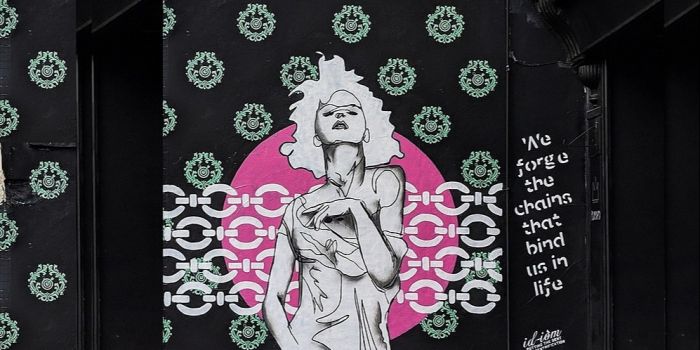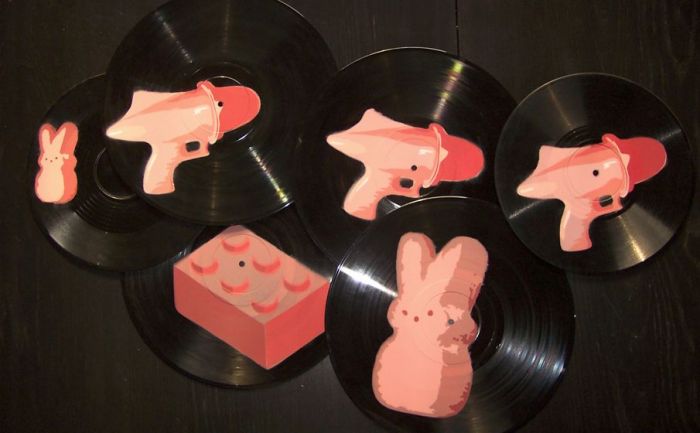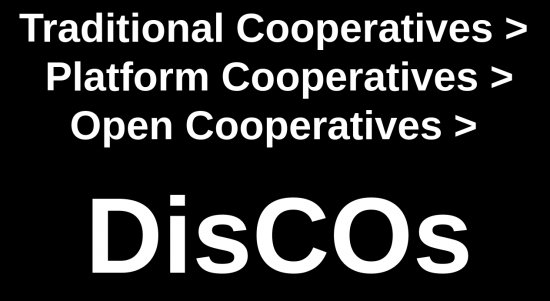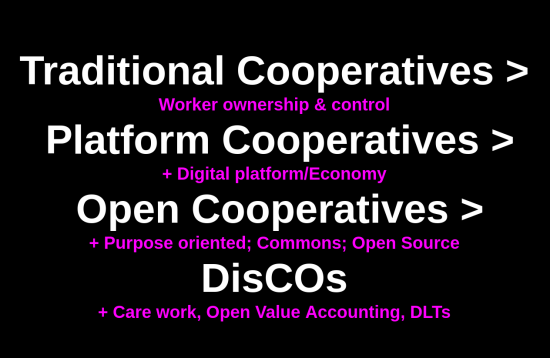Difference between revisions of "DisCO Mothership Governance Model"
| Line 58: | Line 58: | ||
'''<big>1: [https://hackernoon.com/last-night-a-distributed-cooperative-organization-saved-my-life-a-brief-introduction-to-discos-4u5cv2zmn Last Night A Distributed Cooperative Organization Saved My Life: A brief introduction to DisCOs]</big>''' | '''<big>1: [https://hackernoon.com/last-night-a-distributed-cooperative-organization-saved-my-life-a-brief-introduction-to-discos-4u5cv2zmn Last Night A Distributed Cooperative Organization Saved My Life: A brief introduction to DisCOs]</big>''' | ||
| | ||
| + | |||
| + | <blockquote>"DisCO stands for '''Distributed Cooperative Organizations''', and it’s a set of organisational tools and practices for groups of people who want to work together in a cooperative, commons-oriented, and feminist economic form. DisCO is also an alternative to another form called the [https://blockchainhub.net/dao-decentralized-autonomous-organization/?ref=hackernoon.com Decentralized Autonomous Organizations], or [https://hackernoon.com/tagged/dao?ref=hackernoon.com DAO]".</blockquote> | ||
* '''[https://www.youtube.com/watch?v=I7Gv8aQpptI&feature=emb_logo Click here to see video trailer]''' | * '''[https://www.youtube.com/watch?v=I7Gv8aQpptI&feature=emb_logo Click here to see video trailer]''' | ||
------- | ------- | ||
| Line 63: | Line 65: | ||
[[image: DisCO_in_a_Nutshell.jpeg | center | 700 px]] | [[image: DisCO_in_a_Nutshell.jpeg | center | 700 px]] | ||
| | ||
| − | |||
'''<big>2: [https://elements.disco.coop/DisCO-in-a-Nutshell.html DisCO in a Nutshell (Covid Edition)]</big>''' | '''<big>2: [https://elements.disco.coop/DisCO-in-a-Nutshell.html DisCO in a Nutshell (Covid Edition)]</big>''' | ||
Revision as of 09:10, 19 February 2021
Welcome to the DisCO Mothership Governance Model
Hello and welcome! For a brief summary of the DisCO Mothership Governance model, jump direclty to the Introductory Articles, Infographics and Other DisCO Governance Resources section below. To get the full picture, keep reading.
The DisCO MOTHERSHIP refers to the group of people currently working in DisCO.coop and carrying out the DisCO Project [1] This is the governance model by which our organization functions as a living DisCO LAB. THIS MODEL IS CURRENTLY BEING DEVELOPED AMONG THE DisCO MOTHERSHIP TEAM. KEEP CHECKING THIS PAGE FOR ONGOING DEVELOPMENT
This DisCO MOTHERSHIP Governance Model is a substantial fork of Guerrilla Media Collective's version of the DisCO Governance Model. Guerrilla Media Collective (henceforth GMC) is the original DisCO LAB from which DisCO.coop arose.[2] GMC's Governance Model is the base DisCO Governance Model for worker-owned coops , Social Solidarity Enterprises and SMEs.
This version of the DisCO Governance Model (3.5) is not aimed at working collectives offering goods and services in the marketplace, but non profits, such as the DisCO Foundation.[3]
The DisCO MOTHERSHIP Governance Model is being further developed as part of the Distributed Cooperative Organization (DisCO) Governance/Economic Model V 4.0 for eventual inclusion in the DisCO BALL. Version 4.0 is a non DisCO specific version highlighting the main DisCO governance templates, of the DisCO Applications Program or DAP. [4]
All changes between version 3.0 (The Guerrilla Media Collective Model) and version 3.5 (The DisCO MOTHERSHIP/DisCO.NP Model) are tracked in the DIsCO Governance Model Version Changes entry
Overview
This document describes a governance/economic model for self-sustaining, mission-oriented, distributed organizations.
It values pro-bono (love), care, and livelihood work with complementary metrics and dispenses rewards accordingly.
The purpose is to extract people from the capitalist marketplace so they can use their unique talents to do fulfilling, and socially and environmentally meaningful work. The document prototypes a governance model fit for digital labor. This model mixes theory with proven on-the ground practice: it originated in an existing organization: Guerrilla Media Collective or "GMC", also known through the P2P Translation collective Guerrilla Translation [5]
As explained in the Introduction above, this version of the DisCO Governance Model (3.5), is a fork of the GMC model. The version you are currently reading serves three complementary purposes:
- It functions as the template governance model for DisCO Non-Profits (AKA DisCO NP)
- By using DisCO.coop to illustrate the DisCO NP Governance model this document is the de-facto governance model for DisCO.coop
How to read this governance model
In the following sections we'll examine:
- Distributed Cooperative Organizations: a brief introduction to DisCO.
- Roles and responsibilities within the organization and how decisions are made.
- Contribution and tracking: The ways that value is tracked and rewarded.
- Decision making processes: How stewardship is held by all who have demonstrated willingness and invested personal effort participating in the collective's goals.
The last three areas are interdependent. Roles and Responsibilities reflect a member's investment in the DisCO.NP and their level of participation. This investment is not monetary, but contribution based — the more a member puts into building the DisCO.NP, whether through pro-bono, funded or reproductive work [6], the more their investment is weighted in the DisCO.NP's ownership and decision making mechanisms. This investment/stake is measured through Contribution Tracking and it also affects the Decision making process.
While we have presented the three sections sequentially, the document doesn't necessarily follow a linear narrative. Each section refers to the others and the document features many page-jump links to different relevant sections[7] and related entries in the DisCO MOTHERSHIP Wiki. [8].
For now, we recommend reading it at a your own pace, taking notes and jumping from section to section until you have a clear picture. Speaking about pictures, this section features an infographic summary of the model, links to introductory articles and other resources to make the model more digestible.
What we offer here is an equipotential and opt-in engagement governance model. This means that everyone who participates in a collective (and, in this case, a DisCO Non Profit) will have their work valued, and will be expected to participate in the decision making process. Decisions and control are shared, based on contributions and peer review.
To see how we envision the model in practice, DisCO.coop is used as a showcase example, but it’s important to note that the model is designed to be picked up and adapted by other Distributed Cooperative Organizations whether they’re other Non Profits, coops or other tipes of entities (see The DisCO Applications Program section below). To ease the narrative, the terms "DisCO.coop" the "DisCO MOTHERSHIP" and "the collective" are often used interchangeably.For clarification on these terms, please consult the DisCO Glosary and PLACEHOLDER FOR NAME AND WIKI LINK FOR CLARIFICATION DOC
Introductory Articles, Infographics and Other DisCO Governance Resources
If you're not already familiar with DisCO we recommend taking some time to get the picture overview of what we offer before diving deep into the minutiae of this Governance Model.
For a brief introductiion to DisCOs we recommend these two introductory articles, with their corresponding video trailers:
1: Last Night A Distributed Cooperative Organization Saved My Life: A brief introduction to DisCOs
"DisCO stands for Distributed Cooperative Organizations, and it’s a set of organisational tools and practices for groups of people who want to work together in a cooperative, commons-oriented, and feminist economic form. DisCO is also an alternative to another form called the Decentralized Autonomous Organizations, or DAO".
2: DisCO in a Nutshell (Covid Edition)
Precedents to the DisCO Governance Model
like anything else in life, this model didn't arise out of nowhere and is the result of many influences, distilled down to the current DisCO Governance Model.
The Open Enterprise Governance Model
The DisCO Governance Model and its various applications are a substantially developed fork of the Better Means Open Enterprise Governance Model (OEGM). The adaptations have been made to:
- Bypass the original model’s start-up/for-profit orientation
- Address the needs and ideals of
- Benefit a variety of entities self sustain their social vision while addressing their specific requirements and allow for future modifications.
- Shift the focus from technical, protocol-based solutions to relations, trust and care work.
For more influences, see the next section.
From Platform to Open Cooperativism to DisCO
Apart from the Better Means Governance Model, explained above, DisCO has a rich lineage, going from traditional cooperatives, Platform Cooperatives, Open Cooperatives and, with the addition of Feminist Economics, Open Value Accounting and Distributed Ledger Technologies.
Here is a brief explanation of each of these cooperative movements, with links to additional resources:
Cooperatives
A cooperative (or coop/co-op) is any self-governed organization or business in which members focus on mutual assistance while working towards a common goal in everyone’s best interest. Read What is a Cooperative? on the International Cooperative Alliance's (ICA) website for a short introduction.
Platform Cooperatives
Platform Cooperatives seek to democratize the ownership and governance of the digital platforms that increasingly mediate our daily lives. Check out the Platform Cooperativism Consortium's website for abundant resources on Platform Cooperativism.
Open Cooperativism
Open Cooperativism, or "Open Coops" is an approach towards working together that aims for the democratization of ownership and governance, while focusing on the production of commons. Open Coops arose simultaneously with Platform Cooperativism in 2014. Read From Platform to Open Cooperativism to check out the differences and commonalities between Platform and Open Coops or this shorter explanation, which includes infographics and a TLDR.
Open Coops are the precursor to DisCO. DisCO evolves on the initial premises of Open Cooperativism by re-conceptualizing Open Coop's four original principles and adding new, explicit principles on Feminist Economics, Open Value and Federation.
You can read more on the Seven DisCO Principles on Chapter 3 of the DisCO Elements or this wiki's entry on DisCO in 7 Principles and 11 Values. You can also jump to an abbreviated summary of the Principles in this section of the Mothership Governance Model.
DisCOs are not necessarily better than their precursors. They more specifically focused in social and enviromental outcomes from a feminist, decolonial and post-capitalist point of view. On the one hand DisCO gathers the best of the three preeciding movements. On the downside, DisCOs are also more complex in the initial stages, although once their learning curve has been overcome, we'd argue that they function more smoothly and are more resilient organizations. Here are the main differences:
In summary all DisCOs are "classic" cooperatives, Platform Cooperatives and Open Cooperatives, but not all classic, platform or open coops are DisCOs. (Come join us!). The DisCO model has very specific design features and constraints to favor certain (feminist, commons-oriented) outcomes. We will delve into these features in the following sections.
Other Notable Influences in the DisCO DNA
DisCOs main influences are described in Groove is in the Heart: the DisCO Elements chapter 2: DisCO in a Nutshell. From the text:
DisCOs are a cultural and structural framework that combines influences from other forms and movements into a practical toolkit. The framework is based on existing, disruptive economic alternatives normally absent from the blockchain space. They are:
- The Commons and P2P: Self-organized systems stewarding resources to meet human needs while leveraging the power of networks. [9]
- Open Cooperativism: Combining Open Source and Commons principles with those of the cooperative and social solidarity movements.[10]
- Open Value Accounting: Enables value sovereignty by rewarding meaningful contributions to projects, rather than wage labor.[11]
- Feminist Economics: Challenges normative economic abstractions while factoring reproductive and care work.[12]
These influences, together with a strong focus on accessibility and social and economic justice, provide DisCOs with vastly different affordances to other available alternatives such as Decentralized Autonomous Organisations or DAOS.
DisCO has also been strongly influenced by 15 M and Occupy, the Zapatista Movement David Bollier and Silke Helfrich's Free Fair and Alive, Decoloniality, Decolonial and Intersectional Feminisms, our past work at the P2P Foundation [13], Telekommunisten's work on the Venture Commune; Kevin Carson's work on peer to peer post-capitalism, Silvia Federici's work on commons and feminism, the work of Donna Haraway, Parecon, Ursula Huws, and the P2P Lab Research Collective, Punk Rock and Discorniadism, among many others.
To access all these influences and more, check out the following entries:
DisCO in Seven Principles and Eleven Values
'INCLUDE INFOGRAPHIC, BRIED DESCRIPTION WITH ELEMENSTS SHORT TEXT AND LINKS
The DisCO Applications Program
This Governance Model is part of the DisCO Applications Program[14] This is the umbrella term for forks of the original cooperative and Social Solidarity Economy (SSE) oriented version of the DisCO Governance Model.
The DisCO Applications Program includes DisCO Governance Model templates for:
- DisCO4Coops: This is the original DisCO Governance model developed through Guerrilla Media Collective Worker Owned Coops, Social and Solidarity Economy enterprises and mission-oriented SMEs
- DiSCO.NPs for Non Profits in general and Worker Self-Directed Nonprofits in particular.
- DisCO.Phi for Philanthropic Organizations
- DisCO.living for cooperatives and Community Land Trusts
- DisCO.Makes for Maker Spaces and Community Centers
- DisCO.Unbundle for Non-cooperatives and corporations to transition to the DisCO Model.
A mentioned before, the model you are reading is version 3.5, aimed at Non Profits.
MODEL CURRENTLY REVISED UNTIL HERE
Roles and Responsibilities
Discussion and text in progress
Contribution Tracking
Discussion and text in progress
Decision Making
Discussion and text in progress
TLDR and Conclusion
Discussion and text in progress
Links and Resources
Discussion and text in progress
- ↑ Click here to meet the humans involved.
- ↑ You can read more about Guerrilla Media Collective's History and how it morphed into DisCO in chapter 4 of the DisCO Manifesto: Punk Elegance: The Story of Guerrilla Translation and the Guerrilla Media Collective. The DisCO Manifesto is currently only available as a PDF download but, in due time, each chapter will be presented as stand-alone blog posts. GMC's version of the model (3.0).
- ↑ The DisCO Foundation is currently being created in collaboration with Mondragon University and the Platform Cooperativism Consortium
- ↑ Suffering from acronym exhaustion already? Check out NASA's!. This link is limited to the ones beginning with "a". Seriously though, the DAP contains DisCO Governance solutions for all types of organizations.
- ↑ Guerrilla Translation is a DisCO Node of Guerrilla Media Collective.
- ↑ These three terms are further explained below
- ↑ If, after clicking on a page-jump link, you want to return to the previous section, simply press the back key in your browser
- ↑ This wiki is constantly being updated, so all of the content of these links will evolve over time
- ↑ Read What are P2P and the Commons, and how do they relate? For more info.
- ↑ More information in [More information in What is Open Cooperativism?. What is Open Cooperativism?].
- ↑ More information in the P2P Foundation Wiki’s entry on P2P Accounting.
- ↑ For a layperson’s introduction to Feminist Economics, see the Women’s Budget Group’s excellent resources.
- ↑ DisCO is not currently affiliated in any way with the current P2P Foundation
- ↑ The name is based on the Apollo Applications Program. Nixon decided to cancel the last three moon missions to divert funds to the Vietnam War but the hardware was used for Low Earth Orbit science and Skylab, the US's colossal first space station.




